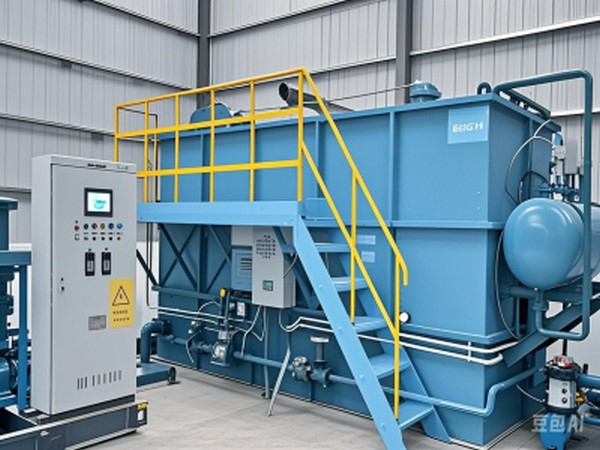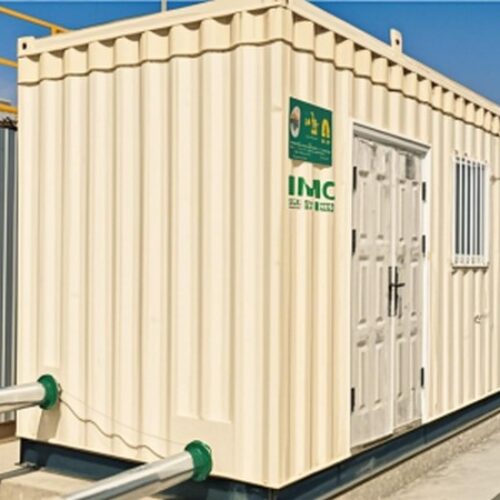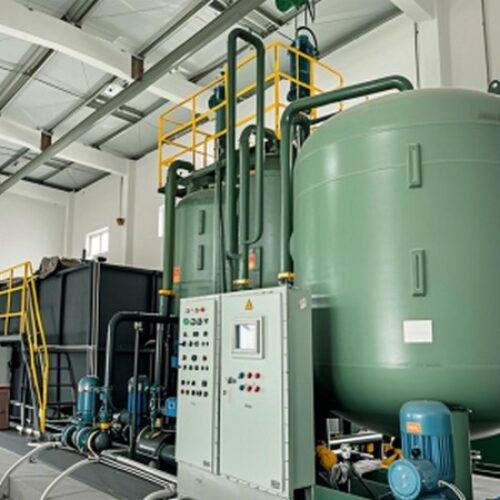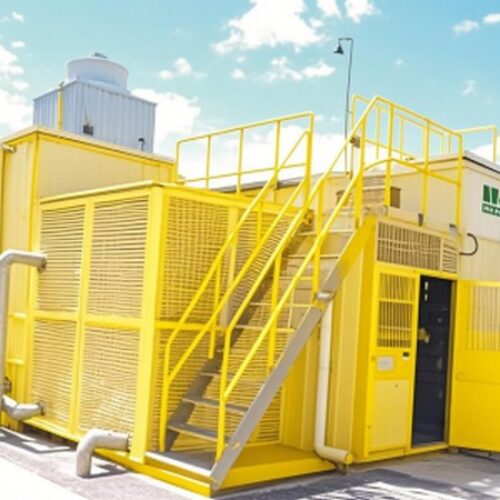Deskripsi
Overview of Integrated Intelligent Oilfield Waste Fluid Treatment Systems:
An integrated intelligent oilfield waste fluid treatment system is a compact, automated, and highly efficient system designed to treat complex waste fluids, including drilling fluids, fracturing flowback water, and produced water. It combines multiple treatment processes with advanced monitoring and control technologies to optimize performance and ensure safe disposal or reuse of treated fluids.
Key Components:
An integrated intelligent oilfield waste fluid treatment system typically includes the following components:
1. Pretreatment Unit:
- Removes large solids, oil, and grease from the waste fluids.
- Common technologies include shale shakers, gravity separators, or hydrocyclones.
2. Chemical Treatment Unit:
- Doses chemicals (e.g., coagulants, flocculants, oxidants) to destabilize and aggregate contaminants.
- Equipped with automated dosing pumps and mixing tanks.
3. Separation Unit:
- Uses advanced separation technologies such as dissolved air flotation (DAF), centrifuges, or membrane filtration to remove suspended solids, oil, and other contaminants.
4. Advanced Treatment Unit:
- Includes processes like electrocoagulation, advanced oxidation processes (AOPs), or reverse osmosis (RO) to remove dissolved contaminants, heavy metals, and organic compounds.
5. Sludge Handling Unit:
- Collects and treats sludge generated during the treatment process.
- May include a sludge dewatering system to reduce volume and facilitate disposal.
6. Disinfection Unit:
- Uses UV sterilization, ozone, or chlorination to eliminate bacteria and pathogens.
7. Control and Monitoring System:
- Features sensors, flow meters, and online analyzers to monitor key parameters (e.g., pH, turbidity, oil content, TDS).
- Utilizes PLC (Programmable Logic Controller) or SCADA (Supervisory Control and Data Acquisition) systems for real-time data analysis and automated control.
Working Principle:
The integrated intelligent oilfield waste fluid treatment system operates as follows:
- Pretreatment: Waste fluids undergo initial separation to remove large solids and free oil.
- Chemical Treatment: Chemicals are added to destabilize and aggregate contaminants for easier removal.
- Separation: Advanced separation technologies remove suspended solids, oil, and other contaminants.
- Advanced Treatment: Dissolved contaminants are removed using processes like electrocoagulation, AOPs, or RO.
- Sludge Handling: Sludge is collected, dewatered, and prepared for disposal.
- Disinfection: Treated fluids are disinfected to ensure they are free from harmful microorganisms.
- Monitoring and Control: The system continuously monitors fluid quality and adjusts operations in real time to maintain optimal performance.
Applications in Oilfield Waste Fluid Treatment:
Integrated intelligent oilfield waste fluid treatment systems are used for:
- Drilling Fluid Treatment: Treating waste drilling fluids to recover reusable water and reduce environmental impact.
- Fracturing Flowback Water Treatment: Treating flowback water from hydraulic fracturing operations for reuse or safe disposal.
- Produced Water Treatment: Treating produced water to meet discharge or reuse standards.
- Waste Fluid Recycling: Enabling the reuse of treated fluids in oilfield operations to reduce freshwater consumption.
Advantages:
- Compact and Modular Design: Saves space and allows for easy installation and expansion.
- Automation: Reduces manual intervention and ensures consistent treatment performance.
- High Efficiency: Combines multiple treatment processes to achieve superior fluid quality.
- Real-Time Monitoring: Provides continuous data for proactive decision-making and optimization.
- Cost-Effective: Reduces operational and maintenance costs through automation and efficient resource use.
- Environmental Compliance: Ensures treated fluids meet regulatory standards for discharge or reuse.
Challenges:
- High Initial Investment: Requires significant upfront capital for advanced technologies and automation.
- Complex Maintenance: Requires skilled personnel for maintenance and troubleshooting.
- Adaptability: May need customization to handle varying fluid compositions and flow rates.
Summary:
Integrated intelligent oilfield waste fluid treatment systems are state-of-the-art solutions for managing and treating complex waste fluids in the oil and gas industry. They combine advanced treatment technologies, automation, and real-time monitoring to deliver efficient, reliable, and environmentally compliant waste fluid treatment. Their compact design and versatility make them ideal for addressing the challenges of oilfield waste fluid management.





Ulasan
Belum ada ulasan.